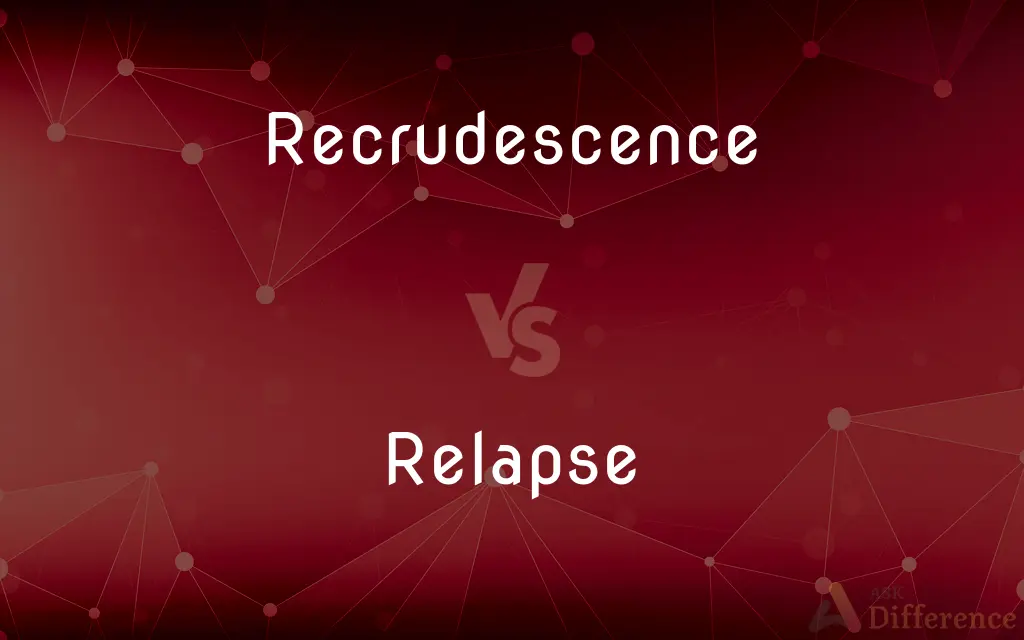Recrudescence vs. Relapse — What's the Difference?
By Urooj Arif & Fiza Rafique — Updated on March 26, 2024
Recrudescence is the reappearance of symptoms after a period of improvement without completely vanishing, while relapse is the deterioration in someone's state of health after a temporary improvement.

Difference Between Recrudescence and Relapse
Table of Contents
ADVERTISEMENT
Key Differences
Recrudescence refers to the return of symptoms of a disease or condition after a period of improvement, but crucially, these symptoms had never fully disappeared. This is often observed in diseases where the causative agent remains dormant within the body and then becomes active again. On the other hand, relapse describes a situation where symptoms reappear after they had completely ceased, indicating a renewed phase of illness after a period of recovery. This distinction is particularly important in the management and treatment of chronic diseases.
In the context of chronic illnesses, recrudescence highlights the challenge of managing diseases that can hide below the threshold of detection. These conditions require continuous monitoring because the disease is not truly eradicated, even when symptoms improve. Whereas, relapse signifies the need for a reevaluation of the disease management strategy since the illness had been in a state of remission or cured before symptoms reappeared. This difference underscores the importance of understanding the disease's nature for effective treatment.
Recrudescence can often be mistaken for a new onset of the disease because the symptoms reappear after seeming improvement. This scenario is common in infections like malaria, where parasites can remain dormant in the liver before becoming active again. In contrast, relapse is clearly marked by a phase of no symptoms, which is then followed by the return of the disease, as seen in conditions like cancer, where the disease can come back after being in remission.
The management strategies for recrudescence and relapse also differ. In recrudescence, the focus may be on long-term management strategies that aim to control the symptoms and prevent the disease from becoming active again. On the other hand, relapse may require a reassessment of the treatment plan, including changes in medication or therapy, to address the reemergence of the disease. This differentiation is critical for healthcare providers to devise appropriate treatment plans.
Understanding the difference between recrudescence and relapse is vital for patient education and setting realistic expectations for the course of a disease. Patients with conditions prone to recrudescence should be aware that symptoms may reappear even with ongoing treatment, while patients in remission should understand the signs of relapse. This knowledge can empower patients to seek timely medical advice and adhere to treatment plans.
ADVERTISEMENT
Comparison Chart
Definition
Reappearance of symptoms after improvement, without full remission
Return of symptoms after a period of full remission
Symptom Continuity
Symptoms never fully disappeared
Symptoms had completely ceased
Common in Diseases
Malaria, herpes
Cancer, multiple sclerosis
Treatment Implication
Long-term management to prevent activation
May require treatment plan reassessment
Patient Education
Symptoms may reappear despite treatment
Importance of recognizing signs of disease return
Compare with Definitions
Recrudescence
Reappearance of disease symptoms after a period of improvement without the symptoms ever fully disappearing.
After weeks of treatment, the patient experienced recrudescence of malaria symptoms.
Relapse
A setback in the recovery process after a period of improvement.
His health took a sudden turn for the worse, marking a relapse that required immediate hospitalization.
Recrudescence
Return of a medical condition without reaching full remission.
The patient showed signs of recrudescence in her chronic condition, complicating her recovery process.
Relapse
The return of a disease or the deterioration of health after a temporary improvement.
The patient suffered a relapse of symptoms two months after being declared in remission.
Recrudescence
A medical scenario where dormant symptoms become active again.
Despite initial improvement, recrudescence of symptoms was observed, indicating the disease was not fully eradicated.
Relapse
Reemergence of disease symptoms after a period of absence.
The relapse of her condition was both unexpected and disheartening to the family.
Recrudescence
A resurgence of activity or condition that had been dormant.
The recrudescence of the virus was unexpected and required immediate medical attention.
Relapse
Deterioration in someone's state of health after an apparent recovery.
The relapse into illness was a major setback in his journey toward recovery.
Recrudescence
The phenomenon of symptoms reappearing without having fully disappeared.
Recrudescence of her symptoms suggested a dormant phase rather than a complete recovery.
Relapse
The recurrence of a condition that had previously improved or resolved.
After months of no symptoms, his sudden relapse was a significant concern.
Recrudescence
Recrudescence is the revival of material or behavior that had previously been stabilized, settled, or diminished. In medicine, it is usually defined as the recurrence of symptoms after a period of remission or quiescence, in which sense it can sometimes be synonymous with relapse.
Relapse
In internal medicine, relapse or recidivism is a recurrence of a past (typically medical) condition. For example, multiple sclerosis and malaria often exhibit peaks of activity and sometimes very long periods of dormancy, followed by relapse or recrudescence.
Recrudescence
To break out anew or come into renewed activity, as after a period of quiescence.
Relapse
To return to a former state.
Recrudescence
The condition or state being recrudescent; the condition of something (often undesirable) breaking out again, or re-emerging after temporary abatement or suppression.
Relapse
To become sicker after partial recovery from an illness.
Recrudescence
The acute recurrence of a disease, or its symptoms, after a period of improvement.
Relapse
To recur. Used of an illness.
Recrudescence
(botany) The production of a fresh shoot from a ripened spike.
Relapse
To slip back into bad ways; backslide.
Recrudescence
The state or condition of being recrudescent.
A recrudescence of barbarism may condemn it [land] to chronic poverty and waste.
Relapse
A return to a former state, especially after apparent improvement.
Recrudescence
Increased severity of a disease after temporary remission.
Relapse
(intransitive) To fall back again; to slide or turn back into a former state or practice.
He has improved recently but keeps relapsing into states of utter confusion.
To relapse into a stupor, into vice, or into barbarism
To relapse into slumber after being disturbed
Recrudescence
A return of something after a period of abatement;
A recrudescence of racism
A recrudescence of the symptoms
Relapse
To recur; to worsen, be aggravated after a period of improvement.
Relapse
To return to a vice, especially self-harm or alcoholism, failing to maintain abstinence.
Relapsed after 5 months of being clean
Relapse
To slip or slide back physically; to turn back.
Relapse
The act or situation of relapsing.
A drug relapse
Relapse
(medicine) An occasion when a person becomes ill again after a period of improvement
Relapse
(obsolete) One who has relapsed, or fallen back into error; a backslider.
Relapse
To slip or slide back, in a literal sense; to turn back.
Relapse
To slide or turn back into a former state or practice; to fall back from some condition attained; - generally in a bad sense, as from a state of convalescence or amended condition; as, to relapse into a stupor, into vice, or into barbarism; - sometimes in a good sense; as, to relapse into slumber after being disturbed.
That task performed, [preachers] relapse into themselves.
Relapse
To fall from Christian faith into paganism, heresy, or unbelief; to backslide.
They enter into the justified state, and so continue all along, unless they relapse.
Relapse
A sliding or falling back, especially into a former bad state, either of body or morals; backsliding; the state of having fallen back.
Alas! from what high hope to what relapseUnlooked for are we fallen!
Relapse
One who has relapsed, or fallen back, into error; a backslider; specifically, one who, after recanting error, returns to it again.
Relapse
A failure to maintain a higher state
Relapse
Deteriorate in health;
He relapsed
Relapse
Go back to bad behavior;
Those who recidivate are often minor criminals
Common Curiosities
What is recrudescence?
Recrudescence is the reappearance of symptoms after a period of improvement, where the symptoms had not fully disappeared.
How is recrudescence different from a relapse?
Recrudescence involves symptoms that never fully disappeared, whereas a relapse occurs after symptoms had completely ceased.
What causes recrudescence?
Recrudescence can be caused by diseases where the pathogen remains dormant in the body and becomes active again, such as in some viral or parasitic infections.
What causes a relapse?
A relapse can be triggered by various factors, including stress, infection, or cessation of treatment.
How can relapses be managed?
Managing relapses often requires reassessing and adjusting the treatment plan.
How can recrudescence be prevented?
Preventing recrudescence involves continuous management and monitoring of the condition, even after symptoms improve.
What is a relapse?
A relapse is the return of a disease or symptoms after a period of improvement or remission.
Can recrudescence occur in any disease?
Recrudescence is more common in diseases capable of remaining dormant within the body, such as certain infections.
Is a relapse always serious?
The seriousness of a relapse depends on the disease, the severity of the recurrence, and the individual's overall health.
Are there ways to monitor for recrudescence or relapse?
Regular medical check-ups and monitoring of symptoms can help detect recrudescence or relapse early.
Can lifestyle changes help prevent relapses?
In some conditions, lifestyle changes can help reduce the risk of relapses by improving overall health.
How do patients cope with recrudescence or relapse?
Coping strategies may include medication adherence, psychological support, and lifestyle modifications to manage symptoms and improve quality of life.
Do recrudescence and relapse require different treatments?
Yes, treatment approaches may differ, with recrudescence focusing on long-term management and relapse potentially requiring treatment adjustments.
Can recrudescence lead to complications?
If not properly managed, recrudescence can lead to complications similar to those of the initial disease phase.
Can relapse indicate treatment failure?
Not necessarily; a relapse can indicate the need for treatment reassessment, but it doesn’t always mean the initial treatment failed.
Share Your Discovery

Previous Comparison
Invertivore vs. Insectivore
Next Comparison
Emerald vs. CorundumAuthor Spotlight
Written by
Urooj ArifUrooj is a skilled content writer at Ask Difference, known for her exceptional ability to simplify complex topics into engaging and informative content. With a passion for research and a flair for clear, concise writing, she consistently delivers articles that resonate with our diverse audience.
Co-written by
Fiza RafiqueFiza Rafique is a skilled content writer at AskDifference.com, where she meticulously refines and enhances written pieces. Drawing from her vast editorial expertise, Fiza ensures clarity, accuracy, and precision in every article. Passionate about language, she continually seeks to elevate the quality of content for readers worldwide.














































